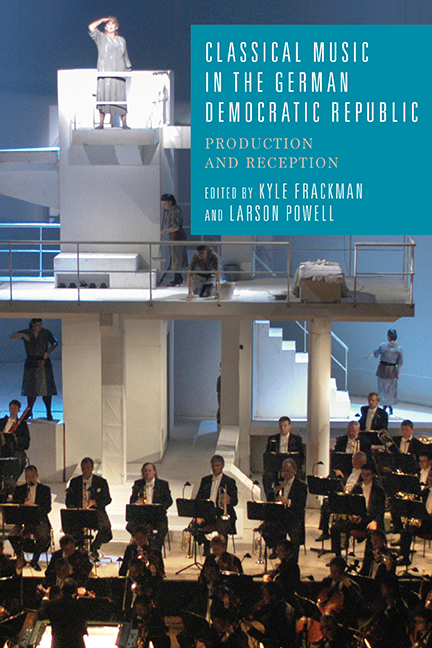Book contents
- Frontmatter
- Contents
- Acknowledgments
- List of Abbreviations
- Introduction: Music and Heritage in the German Democratic Republic
- 1 Provincialism, Modernity, and the Classical Heritage: The Administrative Structure of the GDR and the Situation of Music Production
- 2 Classicism as Anti-Fascist Heritage: Realism and Myth in Ernst Hermann Meyer’s Mansfelder Oratorium (1950)
- 3 Positioning Georg Knepler in the Musicological Discourse of the GDR
- 4 Ehrt euren Deutschen Meister: Reproducing Wagner in the GDR
- 5 The Embodiment of Collective Memory in Neue Odyssee
- 6 Marxism and Feminism in Ruth Berghaus’s Staging of Don Giovanni
- 7 Beyond the Gewandhaus: Mahler and the GDR
- 8 Hanns Eisler’s Funeral and Cultures of Commemoration in the GDR
- 9 Exile—Remigration—Socialist Realism: The Role of Classical Music in the Works of Paul Dessau
- 10 “What a Satisfying Task for a Composer!”: Paul Dessau’s Music for The German Story (. . .Du und mancher Kamerad)
- 11 Friedrich Schenker and the Third Way
- 12 A Prism of East German Music: Lothar Voigtländer
- Notes on the Contributors
- Index
9 - Exile—Remigration—Socialist Realism: The Role of Classical Music in the Works of Paul Dessau
Published online by Cambridge University Press: 21 May 2021
- Frontmatter
- Contents
- Acknowledgments
- List of Abbreviations
- Introduction: Music and Heritage in the German Democratic Republic
- 1 Provincialism, Modernity, and the Classical Heritage: The Administrative Structure of the GDR and the Situation of Music Production
- 2 Classicism as Anti-Fascist Heritage: Realism and Myth in Ernst Hermann Meyer’s Mansfelder Oratorium (1950)
- 3 Positioning Georg Knepler in the Musicological Discourse of the GDR
- 4 Ehrt euren Deutschen Meister: Reproducing Wagner in the GDR
- 5 The Embodiment of Collective Memory in Neue Odyssee
- 6 Marxism and Feminism in Ruth Berghaus’s Staging of Don Giovanni
- 7 Beyond the Gewandhaus: Mahler and the GDR
- 8 Hanns Eisler’s Funeral and Cultures of Commemoration in the GDR
- 9 Exile—Remigration—Socialist Realism: The Role of Classical Music in the Works of Paul Dessau
- 10 “What a Satisfying Task for a Composer!”: Paul Dessau’s Music for The German Story (. . .Du und mancher Kamerad)
- 11 Friedrich Schenker and the Third Way
- 12 A Prism of East German Music: Lothar Voigtländer
- Notes on the Contributors
- Index
Summary
EXILE DID MORE THAN damage the lives of those who were forced to leave Nazi Germany. Exile was certainly a traumatic experience, but in some cases it was also a creative experience. Some intellectuals and artists who were expelled from their home country reshaped their intellectual and artistic profile in their new environment. Paul Dessau, for example, became conscious of his Jewishness while in exile in Paris; he studied Arnold Schoenberg's dodecaphony while becoming aware of music's power to fight fascism in particular and injustice in general. His interest in modernist compositional techniques was paralleled by his profound interest in historical music, especially the music of Johann Sebastian Bach. For many emigrants the history of German music of the distant past became a symbol for an untainted German Kultur.
In the case of Paul Dessau, the complex interdependencies of exile, religion (Dessau's newly found interest in his Jewish cultural heritage), politics (his antifascist orientation, which led to his conversion to communism under the influence of Bertolt Brecht), and compositional technique shaped his poetics and aesthetics after returning to East Germany, particularly with respect to the precarious situation of composers in the GDR under the auspices of socialist realism. It only sounds paradoxical that the discourse on classical music in the GDR overlapped with the discourse on modernity in music. My essay builds on some of the key points I have elaborated on in more detail in my work on Paul Dessau, music in the GDR, and Cold War Studies, while it expands on the significance of exile (and remigration) for Paul Dessau's compositional work.
Biographical Background
Paul Dessau was a child of his time. His family provides a good example for the peaceful coexistence of German and Jewish identities in Imperial Germany. His uncle, Moses Berend Dessau, worked as a cantor in a synagogue, and his father, a small businessman and later worker, sang Schubert's Lieder and pieces from Wagner operas like An den Abendstern from Tannhäuser in the evening hours. In addition, Paul Dessau's cousin, Jean Gilbert (1879–1942), was a successful operetta composer and entrepreneur in light music who introduced his younger cousin to the world of popular music.
- Type
- Chapter
- Information
- Classical Music in the German Democratic RepublicProduction and Reception, pp. 183 - 194Publisher: Boydell & BrewerPrint publication year: 2015

